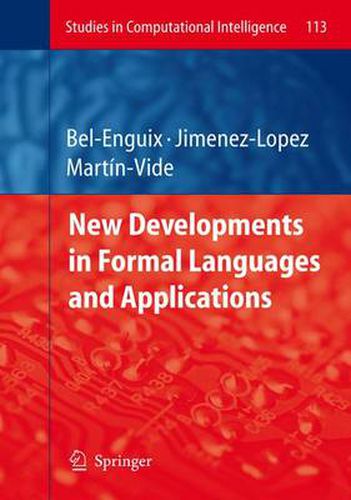Readings Newsletter
Become a Readings Member to make your shopping experience even easier.
Sign in or sign up for free!
You’re not far away from qualifying for FREE standard shipping within Australia
You’ve qualified for FREE standard shipping within Australia
The cart is loading…






This title is printed to order. This book may have been self-published. If so, we cannot guarantee the quality of the content. In the main most books will have gone through the editing process however some may not. We therefore suggest that you be aware of this before ordering this book. If in doubt check either the author or publisher’s details as we are unable to accept any returns unless they are faulty. Please contact us if you have any questions.
The theory of formal languages is widely recognized as the backbone of theoretical computer science, originating from mathematics and generative linguistics, among others. As a foundational discipline, formal language theory concepts and techniques are present in a variety of theoretical and applied fields of contemporary research which are concerned with symbol manipulation: discrete mathematics, bioinformatics, natural language processing, pattern recognition, text retrieval, learning, cryptography, compression, etc. This volume presents the main results of some recent, quickly developing subfields of formal language theory in an easily accessible way and provides the reader with extensive bibliographical references to go deeper. Open problems are formulated too. The intended audience consists of undergraduates and graduates in computer science or mathematics. Graduates in other disciplines (linguistics, electrical engineering, molecular biology, logic) with some basic level of mathematical maturity may find the volume appealing and useful too. The book represents ‘a gate to formal language theory and its applications’ and a source of information in computation theory in general. This volume is complementary of the volumes in the Springer series Studies in Fuzziness and Soft Computing, number 148, and Studies in Computational Intelligence, 25.
$9.00 standard shipping within Australia
FREE standard shipping within Australia for orders over $100.00
Express & International shipping calculated at checkout
Stock availability can be subject to change without notice. We recommend calling the shop or contacting our online team to check availability of low stock items. Please see our Shopping Online page for more details.
This title is printed to order. This book may have been self-published. If so, we cannot guarantee the quality of the content. In the main most books will have gone through the editing process however some may not. We therefore suggest that you be aware of this before ordering this book. If in doubt check either the author or publisher’s details as we are unable to accept any returns unless they are faulty. Please contact us if you have any questions.
The theory of formal languages is widely recognized as the backbone of theoretical computer science, originating from mathematics and generative linguistics, among others. As a foundational discipline, formal language theory concepts and techniques are present in a variety of theoretical and applied fields of contemporary research which are concerned with symbol manipulation: discrete mathematics, bioinformatics, natural language processing, pattern recognition, text retrieval, learning, cryptography, compression, etc. This volume presents the main results of some recent, quickly developing subfields of formal language theory in an easily accessible way and provides the reader with extensive bibliographical references to go deeper. Open problems are formulated too. The intended audience consists of undergraduates and graduates in computer science or mathematics. Graduates in other disciplines (linguistics, electrical engineering, molecular biology, logic) with some basic level of mathematical maturity may find the volume appealing and useful too. The book represents ‘a gate to formal language theory and its applications’ and a source of information in computation theory in general. This volume is complementary of the volumes in the Springer series Studies in Fuzziness and Soft Computing, number 148, and Studies in Computational Intelligence, 25.